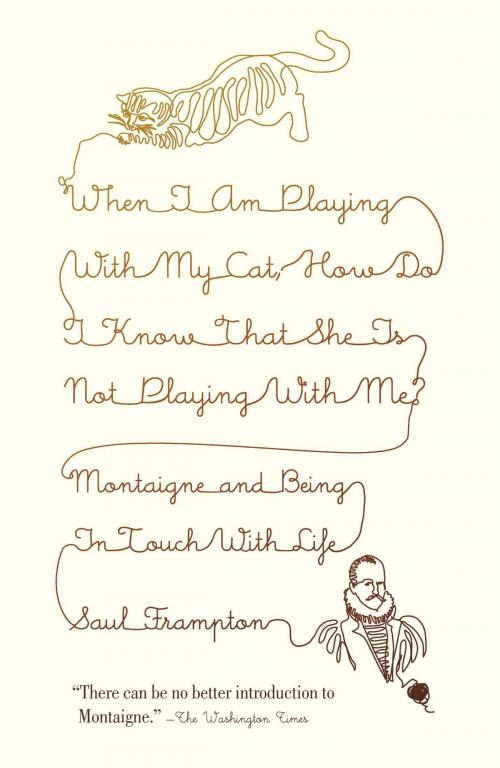When I Am Playing with My Cat, How Do I Know That She Is Not Playing with Me?
Montaigne and Being in Touch with Life
Biography & Memoir, Philosophers, Nonfiction, History, Renaissance, Religion & Spirituality, Philosophy| Author: | Saul Frampton | ISBN: | 9780307379597 |
| Publisher: | Knopf Doubleday Publishing Group | Publication: | March 15, 2011 |
| Imprint: | Vintage | Language: | English |
| Author: | Saul Frampton |
| ISBN: | 9780307379597 |
| Publisher: | Knopf Doubleday Publishing Group |
| Publication: | March 15, 2011 |
| Imprint: | Vintage |
| Language: | English |
“When I dance, I dance; when I sleep, I sleep. And when I
am walking alone in a beautiful orchard, if my thoughts
are sometimes preoccupied elsewhere, the rest of the time I
bring them back to the walk, to the orchard, to the sweetness
of this solitude, and to me.”
—Montaigne
In the year 1570,at the age of thirty-seven, Michel de Montaigne gave up his job as a magistrate and retired to his château to brood on his own private grief—the deaths of his best friend, his father, his brother, and his firstborn child. On the ceiling of his library he inscribed a phrase from the Roman poet and philosopher Lucretius: “There is no new pleasure to be gained by living longer.”
But finding his mind agitated rather than settled by this idleness, Montaigne began to write, giving birth to the Essays—short prose explorations of an amazingly wide range of subjects. And gradually, over the course of his writing, Montaigne rejected his stoical pessimism and turned from a philosophy of death to a philosophy of life. He erased Lucretius’s melancholy fatalism and began to embrace the exuberant vitality of living, finding an antidote to death in the most unlikely places—the touch of a hand, the smell of his doublet, the playfulness of his cat, and the flavor of his wine.
Saul Frampton offers a celebration of perhaps the most enjoyable and yet profound of all Renaissance writers, whose essays went on to have a huge impact on figures as diverse as Shakespeare, Emerson, and Orson Welles, and whose thoughts, even today, offer a guide and unprecedented insight into the simple matter of being alive.
“When I dance, I dance; when I sleep, I sleep. And when I
am walking alone in a beautiful orchard, if my thoughts
are sometimes preoccupied elsewhere, the rest of the time I
bring them back to the walk, to the orchard, to the sweetness
of this solitude, and to me.”
—Montaigne
In the year 1570,at the age of thirty-seven, Michel de Montaigne gave up his job as a magistrate and retired to his château to brood on his own private grief—the deaths of his best friend, his father, his brother, and his firstborn child. On the ceiling of his library he inscribed a phrase from the Roman poet and philosopher Lucretius: “There is no new pleasure to be gained by living longer.”
But finding his mind agitated rather than settled by this idleness, Montaigne began to write, giving birth to the Essays—short prose explorations of an amazingly wide range of subjects. And gradually, over the course of his writing, Montaigne rejected his stoical pessimism and turned from a philosophy of death to a philosophy of life. He erased Lucretius’s melancholy fatalism and began to embrace the exuberant vitality of living, finding an antidote to death in the most unlikely places—the touch of a hand, the smell of his doublet, the playfulness of his cat, and the flavor of his wine.
Saul Frampton offers a celebration of perhaps the most enjoyable and yet profound of all Renaissance writers, whose essays went on to have a huge impact on figures as diverse as Shakespeare, Emerson, and Orson Welles, and whose thoughts, even today, offer a guide and unprecedented insight into the simple matter of being alive.















